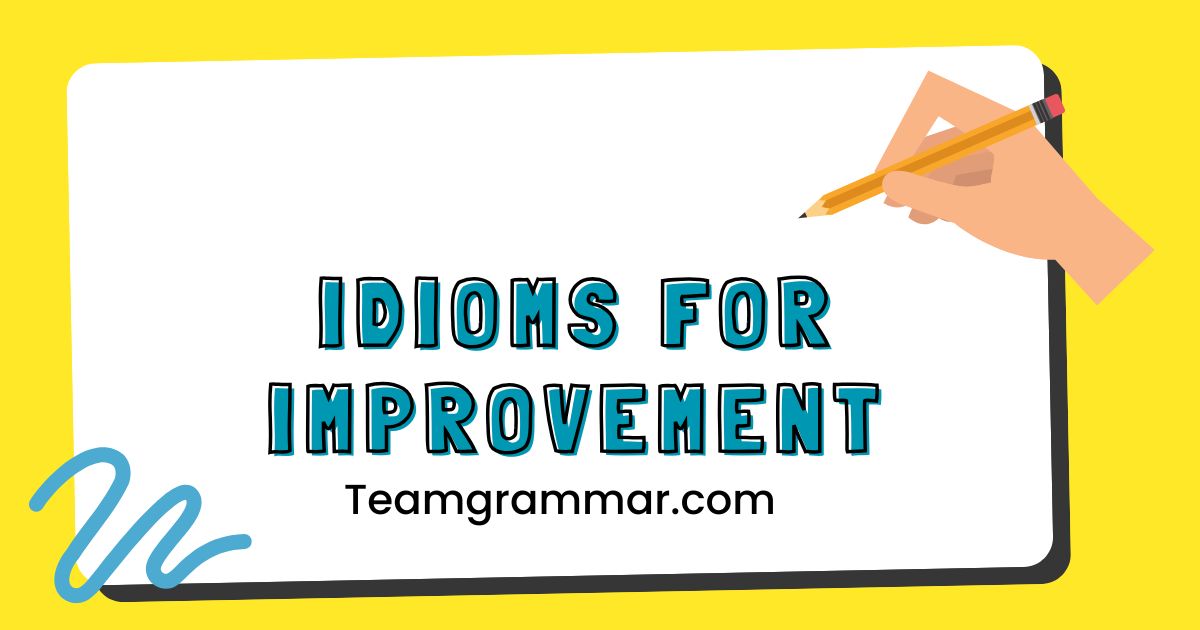41 Idioms for Improvement: Mastering English Expressions
Idioms add color and depth to the English language, allowing speakers to convey complex ideas and emotions in a concise and engaging manner. Mastering idioms related to making things better can significantly enhance your communication skills, making your speech and writing more nuanced and impactful.
This article provides a comprehensive guide to understanding and using these idioms effectively. Whether you’re an ESL learner aiming for fluency or a native speaker looking to refine your language skills, this guide will equip you with the knowledge and practice to confidently incorporate these expressions into your daily conversations and written work.
This guide covers various idioms, their meanings, structural breakdowns, usage rules, and common mistakes to avoid. We’ll explore several examples to illustrate how these idioms are used in context, followed by practice exercises to solidify your understanding.
Dive in to discover how these idioms can help you express positive change and improvement with flair!
Table of Contents
- Definition of Idioms for Making Things Better
- Structural Breakdown of Improvement Idioms
- Types and Categories of Improvement Idioms
- Examples of Idioms for Making Things Better
- Usage Rules for Improvement Idioms
- Common Mistakes with Improvement Idioms
- Practice Exercises
- Advanced Topics in Improvement Idioms
- Frequently Asked Questions (FAQ)
- Conclusion
Definition of Idioms for Making Things Better
Idiomsare expressions whose meanings cannot be understood from the literal meanings of the individual words. They are a type of figurative language that relies on a shared cultural understanding to convey a specific idea or emotion.
Idioms for making things better are a subset of these expressions that specifically refer to improvement, enhancement, repair, or positive change in a situation, object, or person. These idioms often provide a more vivid and memorable way to describe improvement than literal language.
The function of these idioms is to add color and nuance to communication. They allow speakers and writers to express complex ideas or emotions in a concise and engaging manner.
By using idioms, one can convey a sense of optimism, progress, or positive transformation. The context in which an idiom is used is crucial for proper interpretation.
The same idiom can have slightly different connotations depending on the situation and the tone of the speaker.
These idioms can be classified based on the type of improvement they describe. For instance, some idioms relate to physical repair or restoration, while others focus on personal growth or skill development.
Understanding these classifications can help you choose the most appropriate idiom for a given situation.
Structural Breakdown of Improvement Idioms
The structure of improvement idioms varies widely, but many follow common patterns. Some consist of verb phrases, while others are noun phrases or even complete sentences.
Understanding these patterns can help you recognize and use idioms more effectively.
Verb phrasesare common in improvement idioms. These often involve a verb of action combined with a preposition or adverb to create a figurative meaning.
For example, “to turn over a new leaf” is a verb phrase idiom that means to start behaving in a better way. The verb “turn” combines with the prepositional phrase “over a new leaf” to create a new, non-literal meaning.
Noun phrasescan also function as improvement idioms. These typically involve a noun that represents a positive change or improvement.
For example, “a step in the right direction” is a noun phrase idiom that signifies progress toward a desired outcome. The noun “step” is modified by the prepositional phrase “in the right direction” to create a figurative meaning of forward progress.
Some idioms may even be structured ascomplete sentencesthat convey a sense of improvement. For example, “every cloud has a silver lining” is a sentence that serves as an idiom, meaning that every negative situation has a positive aspect.
The entire sentence conveys a figurative meaning, rather than the literal interpretation of each word.
Types and Categories of Improvement Idioms
Idioms for making things better can be categorized based on the specific type of improvement they describe. Here are some common categories:
General Improvement
These idioms refer to improvement in a broad sense, without specifying a particular area. They can be used to describe positive changes in various situations or contexts.
Repair and Restoration
These idioms focus on fixing something that is broken or damaged, bringing it back to its original condition or better.
Development and Growth
These idioms relate to the process of growing, developing, or expanding skills, knowledge, or capabilities.
Refinement and Polishing
These idioms describe the act of improving something that is already good, making it even better through careful attention to detail.
Recovery and Healing
These idioms refer to the process of recovering from an illness, injury, or setback, returning to a state of health or well-being.
Examples of Idioms for Making Things Better
The following tables provide examples of idioms for making things better, organized by category. Each example is accompanied by its meaning and a sample sentence to illustrate its usage.
General Improvement
These idioms capture the essence of improvement in a broad sense, applicable to various situations.
| Idiom | Meaning | Example Sentence |
|---|---|---|
| Turn over a new leaf | To start behaving in a better way | After his arrest, he decided to turn over a new leaf and become a responsible citizen. |
| A step in the right direction | Progress toward a desired outcome | The new policies are a step in the right direction toward solving the environmental crisis. |
| On the mend | Improving after an illness or injury | After a week in the hospital, she is finally on the mend and feeling much better. |
| Look up | To improve or get better | Things are starting to look up for the company after a difficult year. |
| Get better | To improve in health or condition | I hope you get better soon and can join us for the party. |
| Improve | To make or become better | He is trying to improve his grades by studying harder. |
| Make progress | To advance or develop in skills or knowledge | The student is making progress in learning English grammar. |
| Rise to the occasion | To succeed despite facing challenges | The team rose to the occasion and won the championship. |
| Take a turn for the better | To start improving | The patient’s condition took a turn for the better overnight. |
| Brighten up | To become more cheerful or positive | The flowers brightened up the room. |
| Pick up | To improve or increase | Sales have started to pick up in the last quarter. |
| Come a long way | To make considerable progress | She has come a long way since she started learning to play the piano. |
| Gain ground | To make progress or become more popular | The candidate is gaining ground in the polls. |
| Move up in the world | To become more successful or wealthy | He worked hard and moved up in the world. |
| Be on the up and up | To be honest and respectable, but also to be improving | The company is on the up and up with its new management. |
| Out of the woods | Safe from danger or difficulty | The patient is finally out of the woods after the surgery. |
| See the light at the end of the tunnel | To see that a difficult situation is coming to an end | After months of hard work, we can finally see the light at the end of the tunnel. |
| Get one’s act together | To start behaving responsibly and effectively | He needs to get his act together if he wants to keep his job. |
| Get with the program | To start cooperating or conforming | If you want to succeed here, you need to get with the program. |
| Shape up | To improve one’s behavior or performance | He was told to shape up or he would be fired. |
| Make headway | To make progress | The construction team is making headway on the new bridge. |
| Gain traction | To start becoming popular or widely accepted | The new policy is gaining traction among employees. |
| Look alive | To appear more energetic or enthusiastic | The coach told the team to look alive during the game. |
| Step up one’s game | To improve one’s performance or effort | If he wants to win, he needs to step up his game. |
Repair and Restoration
These idioms focus on fixing what’s broken, restoring items to their former glory.
| Idiom | Meaning | Example Sentence |
|---|---|---|
| Patch things up | To resolve a disagreement or repair a relationship | After the argument, they tried to patch things up and move forward. |
| Put something back together | To repair something that is broken or damaged | He spent the weekend trying to put the broken vase back together. |
| Fix up | To repair or renovate something | They decided to fix up their old house instead of buying a new one. |
| Mend fences | To restore friendly relations after a disagreement | The politician tried to mend fences with his opponents after the election. |
| Turn around | To reverse a negative trend or situation | The new CEO was brought in to turn the company around. |
| Set right | To correct something that is wrong | He tried to set right the misunderstanding between them. |
| Straighten out | To resolve a problem or difficulty | They worked together to straighten out the issues with the project. |
| Bring back to life | To restore or rejuvenate something | The artist brought the old painting back to life with careful restoration. |
| Rebuild | To construct again after damage or destruction | The community worked together to rebuild after the hurricane. |
| Renovate | To restore to good condition; make new or as if new again | They plan to renovate their kitchen this summer. |
| Do up | To renovate or redecorate | They decided to do up the spare room to make it a guest bedroom. |
| Revamp | To give new and improved form, structure, or appearance to | The company revamped its website to attract more customers. |
| Restore | To bring back to a former condition | The museum is working to restore the ancient artifacts. |
| Revive | To bring back to life or consciousness | The paramedics managed to revive the patient at the scene. |
| Turn back the clock | To return to a previous time or condition | While we can’t turn back the clock, we can learn from our mistakes. |
| Right the ship | To correct a situation that is going badly | The manager was brought in to right the ship and improve the team’s performance. |
| Get back on track | To return to the correct course or plan | After the setback, they worked hard to get back on track with the project. |
| Clean up one’s act | To start behaving in a more responsible manner | He decided to clean up his act and focus on his career. |
| Dust oneself off | To recover from a setback and try again | After the failure, she dusted herself off and started a new venture. |
| Start from scratch | To begin something anew, from the very beginning | Since the project failed, they had to start from scratch. |
| Pick up the pieces | To recover from a disaster or difficult situation | After the breakup, she needed time to pick up the pieces and move on. |
| Turn the tide | To reverse a negative trend | The new strategy helped to turn the tide and improve sales. |
| Get a new lease on life | To have a fresh start or renewed energy | After the surgery, he felt like he had a new lease on life. |
| Make a comeback | To return to popularity or success after a period of decline | The band made a comeback with their new album. |
Development and Growth
These idioms reflect the ongoing process of getting better, learning, and expanding one’s horizons.
| Idiom | Meaning | Example Sentence |
|---|---|---|
| Come into one’s own | To reach a stage of full development or confidence | She really came into her own after joining the debate team. |
| Spread one’s wings | To become independent and try new things | After graduating, he decided to spread his wings and travel the world. |
| Grow from strength to strength | To become increasingly successful or powerful | The company has grown from strength to strength over the past decade. |
| Reach one’s full potential | To develop one’s abilities to the maximum extent | The coach encouraged the athletes to reach their full potential. |
| Blossom | To develop or open up like a flower | She blossomed into a confident and successful woman. |
| Evolve | To develop gradually | The company’s strategy has evolved over time to meet changing market conditions. |
| Flourish | To grow or develop in a healthy or vigorous way | The business flourished under the new management. |
| Mature | To become fully developed | He has matured a lot since he started working. |
| Progress | To move forward or make advancement | The student is making good progress in his studies. |
| Advance | To move forward or make progress | She has advanced quickly in her career. |
| Cultivate | To foster the growth of | He cultivated his skills through practice and dedication. |
| Nurture | To care for and encourage the growth or development of | Parents nurture their children to help them grow into responsible adults. |
| Polish | To improve or refine | She polished her presentation skills to deliver a more compelling speech. |
| Refine | To improve or perfect | The chef refined his recipe until it was perfect. |
| Sharpen | To improve or enhance | He sharpened his skills by taking additional courses. |
| Hone | To sharpen or perfect a skill | She honed her writing skills through years of practice. |
| Expand one’s horizons | To broaden one’s knowledge or experience | Traveling to new countries can expand one’s horizons. |
| Spread one’s wings | To become independent and try new things | After graduating, he decided to spread his wings and travel the world. |
| Take off | To start to become successful or popular | Her career really took off after she published her first book. |
| Reach for the stars | To aim for ambitious goals | The coach encouraged the team to reach for the stars and win the championship. |
| Go places | To be successful in the future | He is a talented young man who is sure to go places. |
| Climb the ladder | To advance in a career or organization | She worked hard to climb the ladder and become a manager. |
| Make a name for oneself | To become famous or respected | He worked hard to make a name for himself in the industry. |
| Rise through the ranks | To advance in a hierarchy | She rose through the ranks to become the CEO of the company. |
Refinement and Polishing
These idioms are about taking something good and making it great through attention to detail.
| Idiom | Meaning | Example Sentence |
|---|---|---|
| Fine-tune | To make small adjustments to improve something | The engineers fine-tuned the engine to improve its performance. |
| Iron out the kinks | To resolve minor problems or issues | They spent the week ironing out the kinks in the new software. |
| Put the finishing touches on | To add the final details to something | She put the finishing touches on the painting before the exhibition. |
| Smooth out | To remove problems or difficulties | They worked to smooth out the issues with the project timeline. |
| Brush up on | To improve one’s knowledge of something | I need to brush up on my French before the trip. |
| Hone one’s skills | To sharpen or perfect one’s abilities | She honed her skills by practicing every day. |
| Polish up | To improve or refine | He polished up his resume before applying for the job. |
| Touch up | To make small improvements or repairs | She touched up the paint on the walls before the party. |
| Perfect | To make something completely free from faults or defects | The chef spent years perfecting his signature dish. |
| Enhance | To intensify, increase, or further improve the quality, value, or extent of | The new lighting system will enhance the beauty of the artwork. |
| Refine | To improve or perfect by making small changes | The company is constantly refining its products to meet customer needs. |
| Streamline | To make more efficient or effective | They streamlined the process to reduce waste and save time. |
| Upgrade | To raise to a higher standard, in particular improve (equipment or machinery) by adding or replacing components | He decided to upgrade his computer to improve its performance. |
| Amplify | To increase the volume or intensity of | The speaker amplified his voice so everyone could hear him. |
| Bolster | To support or strengthen | The new policy will bolster the company’s reputation. |
| Tweak | To make small adjustments or refinements | The developer tweaked the code to fix the bug. |
| Give a facelift | To improve the appearance of something | They gave the old building a facelift to attract new tenants. |
| Bring up to speed | To provide someone with the latest information or training | The manager brought the new employee up to speed on the project. |
| Get the hang of | To learn how to do something | It took him a while, but he finally got the hang of the new software. |
| Get the knack of | To acquire a skill or talent | She quickly got the knack of playing the guitar. |
| Master | To acquire complete proficiency in a skill or subject | He is working to master the art of cooking. |
| Excel | To be outstandingly good at something | She excels in mathematics and science. |
| Outdo oneself | To surpass one’s own previous performance | He really outdid himself with the presentation. |
| Raise the bar | To set a higher standard | The company raised the bar with its innovative new product. |
Recovery and Healing
These idioms are used when talking about getting better from illness, injury, or difficult experiences.
| Idiom | Meaning | Example Sentence |
|---|---|---|
| Back on one’s feet | Recovered from an illness or difficulty | After a tough year, he’s finally back on his feet. |
| On the road to recovery | Making progress toward regaining health | She’s on the road to recovery after her surgery. |
| Turn the corner | To pass a critical point and start to improve | The patient has turned the corner and is now recovering well. |
| Bounce back | To recover quickly from a setback | The economy is expected to bounce back after the recession. |
| Get over | To recover from an illness or difficult experience | It took her a while to get over the flu. |
| Heal | To become sound or healthy again | Time heals all wounds. |
| Recover | To return to a normal state of health, mind, or strength | He is recovering from a serious illness. |
| Recuperate | To recover from illness or exertion | She is recuperating at home after the surgery. |
| Pull through | To recover from a serious illness or injury | The doctors were amazed that he managed to pull through. |
| Get well | To recover from an illness | I hope you get well soon. |
| Regain | To get something back, especially something that has been lost or taken away | He is working to regain his strength after the illness. |
| Come around | To recover consciousness or health | He eventually came around after the accident. |
| Convalesce | To recover health and strength after illness | She is convalescing at home after her hospital stay. |
| Be on the mend | Improving after an illness or injury | After a week in the hospital, she is finally on the mend and feeling much better. |
| Shake off | To get rid of something, such as an illness or bad mood | He is trying to shake off the cold he caught last week. |
| Snap back | To recover quickly | The athlete snapped back after the injury and returned to competition. |
| Rebound | To recover in value, amount, or strength after a decrease or decline | The stock market rebounded after the initial shock. |
| Return to form | To perform as well as one did in the past | The tennis player has returned to form after her injury. |
| See daylight | To see the end of a difficult situation | After months of struggle, they could finally see daylight. |
| Out of the woods | Safe from danger or difficulty | The patient is finally out of the woods after the surgery. |
| Turn a new page | To start a new chapter in one’s life | After the divorce, she decided to turn a new page and focus on her career. |
| Come to terms with | To accept a difficult situation or reality | It took him a long time to come to terms with the loss. |
| Put something behind you | To forget about a negative experience and move on | She decided to put the past behind her and focus on the future. |
Usage Rules for Improvement Idioms
Using idioms correctly requires attention to context and nuance. While idioms can add color and depth to your language, using them inappropriately can lead to confusion or miscommunication.
Here are some key rules to keep in mind:
- Context is key: Always consider the context in which you are using an idiom. The same idiom can have different connotations depending on the situation and the tone of the speaker.
- Know your audience: Be mindful of your audience when using idioms. Some idioms may be unfamiliar to non-native speakers or people from different cultural backgrounds.
- Avoid overuse: While idioms can enhance your language, overuse can make your speech sound unnatural or forced. Use them sparingly and only when they add value to your communication.
- Maintain grammatical correctness: Ensure that the idiom fits grammatically within the sentence. Do not alter the structure of the idiom to fit your sentence; instead, adjust the sentence to accommodate the idiom.
Tense and agreement: Many idioms can be conjugated to fit different tenses or agree with different subjects. For example, the idiom “turn over a new leaf” can be used in the past tense as “He turned over a new leaf.” Pay attention to the grammatical requirements of the idiom and ensure that it agrees with the rest of the sentence.
Formal vs. informal:Some idioms are more appropriate for informal settings, while others can be used in formal contexts. Consider the formality of the situation when choosing an idiom.
For example, “patch things up” is generally more informal than “resolve a disagreement.”
Cultural sensitivity: Be aware that some idioms may have different meanings or connotations in different cultures. Avoid using idioms that could be offensive or misunderstood by people from diverse backgrounds.
Common Mistakes with Improvement Idioms
Even experienced English speakers sometimes make mistakes when using idioms. Here are some common errors to watch out for:
- Literal interpretation: One of the most common mistakes is interpreting idioms literally. Remember that idioms have figurative meanings that are different from the literal meanings of the individual words.
- Misusing prepositions: Many idioms contain specific prepositions that cannot be changed. For example, it is incorrect to say “on the mend to” instead of “on the mend.”
- Incorrect word order: The word order in an idiom is fixed and cannot be altered. For example, it is incorrect to say “a new leaf turn over” instead of “turn over a new leaf.”
- Overusing idioms: While idioms can enhance your language, overuse can make your speech sound unnatural or forced. Use them sparingly and only when they add value to your communication.
Here are some examples of correct and incorrect usage:
| Incorrect | Correct | Explanation |
|---|---|---|
| She is on the mend to recovery. | She is on the mend. | The correct idiom is “on the mend,” not “on the mend to recovery.” |
| A new leaf turn over. | Turn over a new leaf. | The correct word order is “turn over a new leaf.” |
| He decided to patch up the things. | He decided to patch things up. | The correct idiom is “patch things up,” not “patch up the things.” |
| They are trying to fix up the things between them. | They are trying to patch things up between them. | “Fix up things” is not the correct idiom for repairing a relationship. “Patch things up” is more appropriate. |
Practice Exercises
Test your understanding of idioms for making things better with these practice exercises. Choose the correct idiom to complete each sentence.
Exercise 1: Fill in the Blanks
Choose the correct idiom from the list to complete each sentence:
(turn over a new leaf, a step in the right direction, on the mend, look up, patch things up)
| Question | Answer |
|---|---|
| 1. After his mistake, he decided to ________ and start behaving responsibly. | turn over a new leaf |
| 2. The new policies are ________ towards solving the environmental crisis. | a step in the right direction |
| 3. After a week in the hospital, she is finally ________ and feeling much better. | on the mend |
| 4. Things are starting to ________ for the company after a difficult year. | look up |
| 5. After the argument, they tried to ________ and move forward. | patch things up |
| 6. The economy is expected to ________ after the recession. | bounce back |
| 7. She needs to ________ her French before the trip. | brush up on |
| 8. He ________ after the surgery and is now recovering well. | turned the corner |
| 9. We must ________ our skills if we want to succeed. | hone |
| 10. You need to ________ if you want to keep your job. | shape up |
Exercise 2: Multiple Choice
Choose the best idiom to replace the underlined phrase in each sentence.
| Question | Options | Answer | |
|---|---|---|---|
| 1. After a difficult period, the company is finally improving. | a) on the mend b) looking up c) turning over a new leaf d) patching things up | b) looking up | |
| 2. The new measures are making progress towards resolving the issue. | a) a step in the right direction b) on the mend c) turning over a new leaf d) looking up | a) a step in the right direction | |
| 3. He decided to start behaving better after his mistake. | a) patching things up b) looking up c) turning over a new leaf d) on the mend | c) turning over a new leaf | |
| 4. They are trying to resolve their disagreement after the argument. | a) on the mend b) turning over a new leaf c) patching things up d) looking up | c) patching things up | |
| 5. She is recovering after her surgery. | a) looking up b) patching things up c) turning over a new leaf d) on the mend | d) on the mend | |
| 6. We need | 7.She has finally ________ her skills in playing the guitar. | a) mastered b) looked up c) patching things up d) on the mend | a) mastered |
| 8.I hope that you ________ from your illness. | a) looking up b) patching things up c) get well d) on the mend | c) get well | |
| 9.The economy is ________. | a) looking up b) patching things up c) turning over a new leaf d) bouncing back | d) bouncing back | |
| 10.He needs to ________ if he want to be succesful. | a) shape up b) patching things up c) turning over a new leaf d) on the mend | a) shape up |
Advanced Topics in Improvement Idioms
For those looking to deepen their understanding of improvement idioms, there are several advanced topics to explore.
Historical context: Many idioms have interesting historical origins that shed light on their meanings. Researching the etymology of idioms can provide a deeper appreciation for their cultural significance.
Regional variations: Idioms can vary from one region to another, with different expressions being used to convey the same idea. Exploring these regional variations can enhance your understanding of the diversity of the English language.
Literary usage: Idioms are often used in literature to add depth and color to writing. Analyzing how authors use idioms can provide insights into their craft and the nuances of language.
Cross-cultural comparisons: Comparing idioms across different languages can reveal interesting cultural differences and similarities. This can be particularly useful for language learners who want to understand how different cultures express similar ideas.
Frequently Asked Questions (FAQ)
Conclusion
Mastering idioms for making things better is a valuable skill that can enhance your communication and make your language more engaging and nuanced. By understanding the structure, types, and usage rules of these idioms, you can confidently incorporate them into your daily conversations and written work.
Remember to pay attention to context, know your audience, and avoid common mistakes. With practice and dedication, you can become proficient in using these expressions to convey positive change and improvement with flair.







